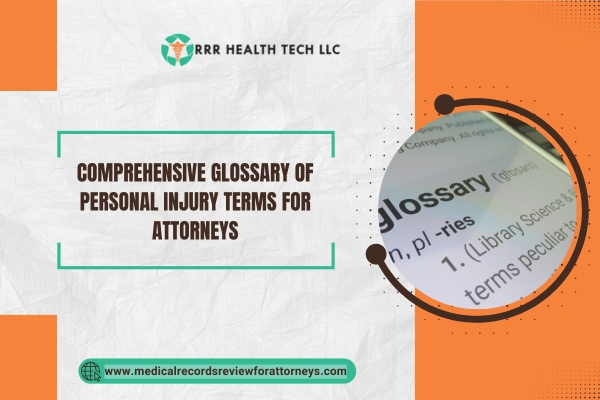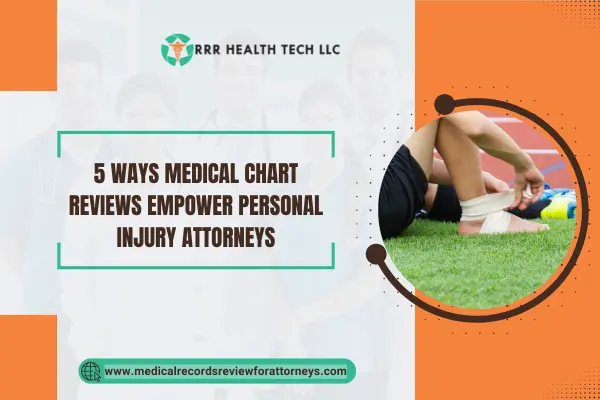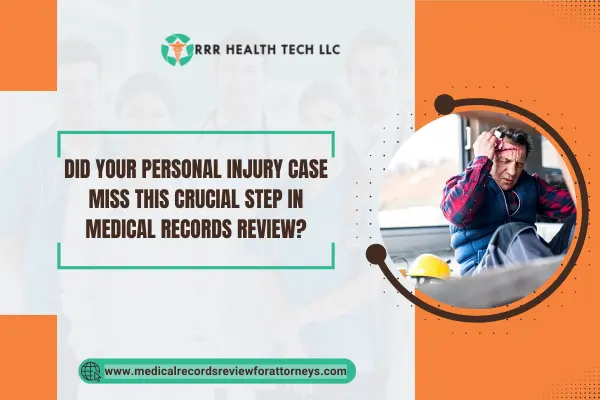
Understanding Personal Injury Terminology
The arena of personal injury law is incredibly vast, and more so for people who do not have much experience with legal concepts. The purpose here is to assist lawyers as well as their clients in enhancing their perspective regarding the basic vocabulary and concepts that are frequently used in personal injury cases. Understanding this terminology will not only increase your level of legal sophistication but also make communication easier during the legal proceedings.
A
Accident Report
This is an official report made by the police or other equally competent authorities that describes how the accident took place and includes witness accounts and other relevant materials.
Act of God
Events that happen with no human participation, for instance, floods and earthquakes are considered an act of god and could have a bearing on liability for personal injuries.
Arbitration
A process of settling disputes outside of court with the aid of a neutral party who has the authority to deliver a decision that is acceptable to both sides.
B
Bodily Injury
An injury sustained by an individual which could range from very minor to life-changing alterations in his/ her bodily functions.
Burden of Proof
In every legal dispute, there is a requirement that a party should prove a claim or allegation that they made which is referred to as the burden of proof.
C
Compensation
This is a form of cover offered to a litigant as payment for damage incurred as a result of some other injury.
Comparative Negligence
A proportionate legal concept that limits the extent of damages awarded to a plaintiff based on the share of negligence they contributed to the occurrence.
D
Damages
A form of monetary payment imposed by any court on the basis of negligence or harmful act committed by a defendant against a claimant/plaintiff.
Defendant
A person or business that is accused of a crime in a court of law.
E
Exemplary Damages
Damages sought not as a means to compensate, but rather to punish the wrongdoer for immoral or unlawful acts.
F
Fraud
An act of deceit, typically for the purpose of financial or personal gain.
G
Gross Negligence
A deviation from the standard of care that demonstrates complete disregard for the safety of other persons.
H
HIPAA
An acronym for the Health Insurance Portability and Accountability Act, which safeguards the confidentiality of a patient’s medical records.
I
Informed Consent
Legally obtained consent from the patient after adequate explanation of the treatment, the benefits, and the risks that may occur.
J
Judgment
The final determination made by a court in a suit outlining the legal standing and responsibilities of the relevant parties in the process.
L
Liability
Legal obligation of a person with respect to reasonable actions to be taken concerning the injury caused to another party.
Litigation
This term refers to the use of the courts to settle issues or disputes through lawsuits and any other legal means.
M
Malpractice
It is a negligent act of professional misfeasance or omission by a physician, nurse, lawyer, etc. that negatively affects a patient’s or client’s health and well-being.
N
Negligence
An unintended act of carelessness that causes damages to the other individual or group of people.
O
Out-of-Court Settlement
An agreement made by the parties involved to compensate for the injuries sustained without dragging the matter to the court for trial.
P
Plaintiff
A person or entity whom a complaint is brought against in court and is said to file a complaint.
Precedent
It means decisions made in earlier case law that set a value that can be followed when similar cases arise in the future.
Q
Quid Pro Quo
It simply means something is given with an expectation of getting something in return. This legal term is mostly used when discussing exchange relationships.
R
Release of Liability
It is a document that states how an individual of a party cannot hold the issuer of the document responsible for any legal action against the party that may arise in the future.
S
Settlement
This term refers to any oral or written agreement made between people, businessmen, or legal bodies to resolve a dispute or conflicts without going to trial and includes the payment of compensation.
Statute of Limitations
This is the period within which the plaintiff is allowed to lodge a complaint in court and tends to differ based on jurisdiction and claims.
T
Tort
An act that inflicts injury or damage upon another and is redressable by an action for damages or other civil legal remedies.
U
Uninsured Motorist Coverage
An insurance rider that indemnifies a person for damages sustained due to a collision with an uninsured vehicle.
V
Verdict
The ultimate decision of the jury or the judge at the conclusion of the trial.
W
Workers Compensation
An insurance program that provides wage replacement and medical benefits to employees injured in the course of employment.
Case Studies
Case Study 1: Slip and Fall Incident
Overview of the Case: A shopper fell and got injured because of the slippery floor in the supermarket.
Challenges:
- Proving carelessness on the part of the store in the absence of proper arguments,
- Establishing how much compensation was needed, including medical treatment and other expenses.
Solutions:
- The lawyer collected the accident report and testimony of people present to prove negligence to the premises’ proprietor.
- Medical records were analyzed and expenses overrated to prove the injuries sustained.
Compensation: The case resulted in a favourable settlement for the plaintiff, covering medical expenses and pain and suffering.
Case Study 2: Medical Malpractice Claim
Overview of the Case: After a surgery, a patient developed complications, which led to a suit being levelled against the surgeon for malpractice.
Challenges:
- Proof that the surgeon acted below acceptable standards.
- Complex medical language along with medical documentation.
Solutions:
• Medical treatment records were carefully audited and gaps in the treatment were noted.
• Evidence that proved negligence on part of the medical professional was sought.
Compensation: The lawsuit ended in a considerable settlement being reached, whereby the patient’s on-going treatment specifically for the injuries caused and the trauma suffered were compensated.
Conclusion
Familiarity with personal injury vocabulary is important because both lawyers and their clients need to have a way out of the mess legal cases are. This legal glossary is useful, as it improves communication and understanding of issues during the legal procedure. Knowing these terms and phrases will certainly help your legal practice and advocacy of clients.


